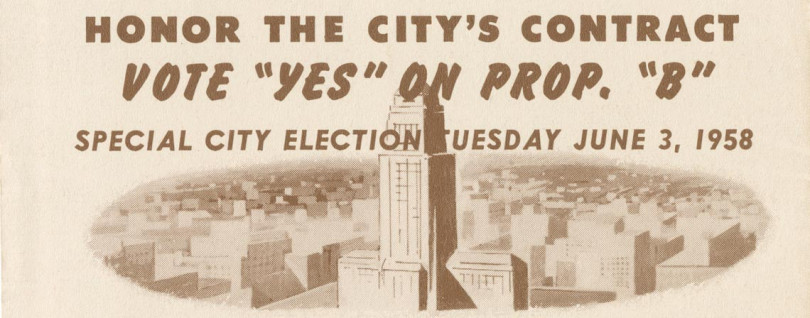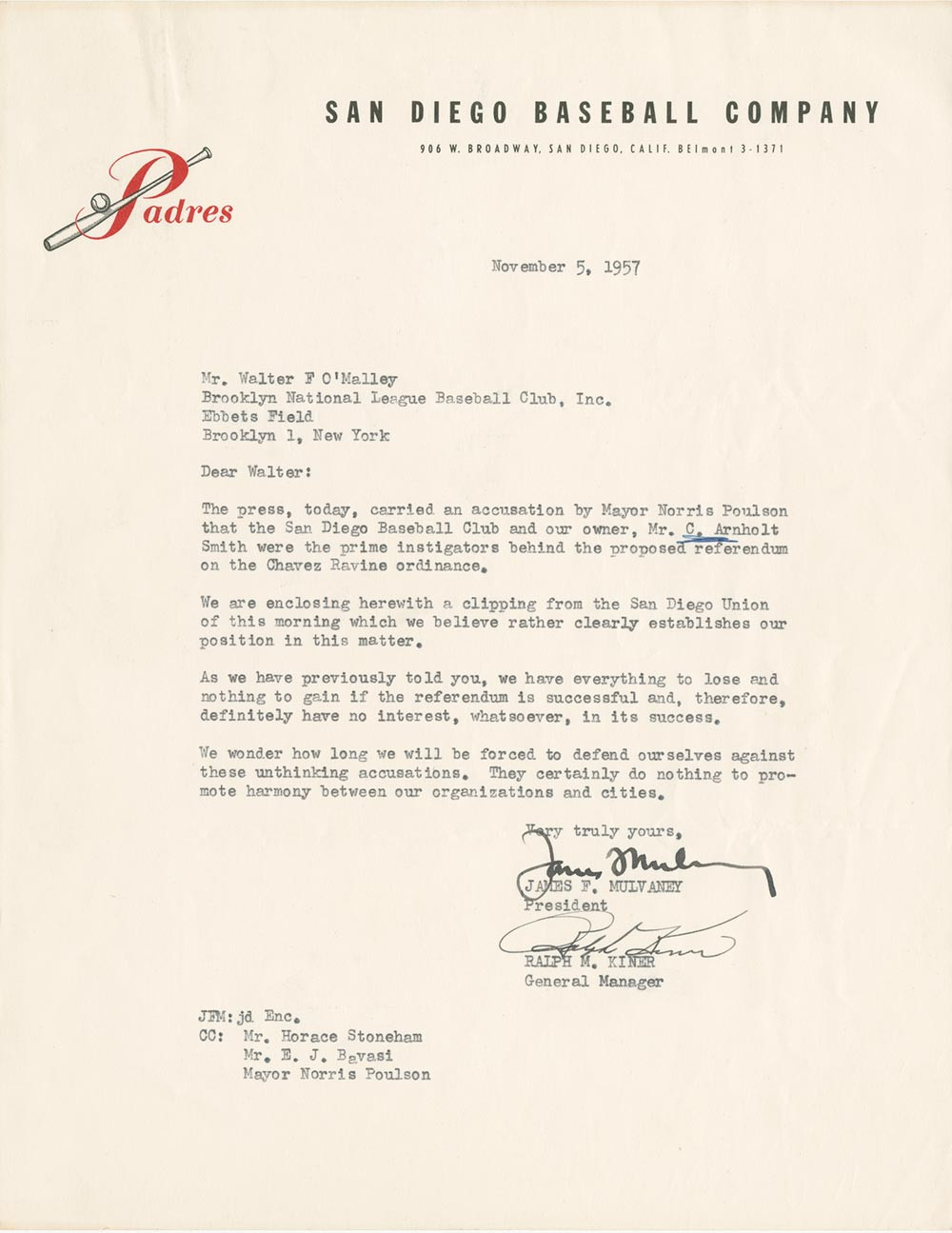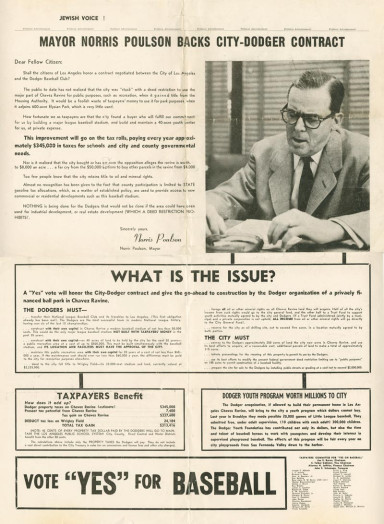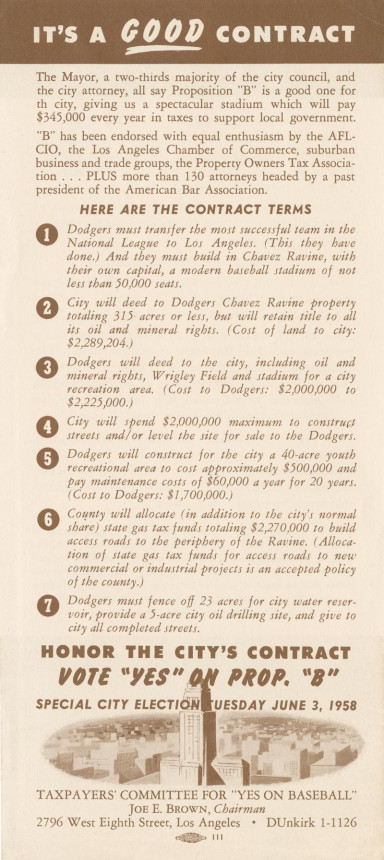
Feature
The Opposition Behind Proposition B
By Brent Shyer
There would not have been a 1958 referendum for voters in Los Angeles to consider regarding baseball had it not been for the co-owners of the San Diego Padres of the Pacific Coast League. J.A. “Blackjack” Smith, a behind-the-scenes Padres owner and his brother, C. Arnholt Smith, financed a well-organized plan to get enough signatures on a petition which would lead to a proposition on the June 1958 ballot in an effort to nullify the October 7, 1957 contract between the City of Los Angeles and the Dodgers. J.A. Smith worked tirelessly from October-November, 1957 to collect signatures and gain the ear of some Los Angeles City councilmembers to defeat the contract before the certification of the petition.
“As we have previously told you, we have everything to lose and nothing to gain if the referendum is successful and, therefore, definitely have no interest, whatsoever, in its success.”
James F. Mulvaney
President, San Diego Padres & Ralph Kiner, General Manager, San Diego Padres letter to Walter O’Malley, November 5, 1957
On November 5, 1957, James F. Mulvaney, President of the San Diego Padres, and former major leaguer Ralph Kiner, General Manager of the Padres, wrote a joint letter sent to Dodger President Walter O’Malley stating, “The press, today, carried an accusation by Mayor Norris Poulson that the San Diego Baseball Club and our owner, Mr. C. Arnholt Smith were the prime instigators behind the proposed referendum on the Chavez Ravine ordinance….As we have previously told you, we have everything to lose and nothing to gain if the referendum is successful and, therefore, definitely have no interest, whatsoever, in its success.”
Some 51,700 signatures were gathered by November 14, 1957. Thirty days were required to verify the signatures by the City Clerk. Also on November 5, Los Angeles Mayor Norris Poulson stated, "From several unimpeachable sources I am told that Mr. J.A. Smith is using every effort to defeat the Dodger legislation." New York Journal-American, “L.A. Mayor Scents Anti-Dodger Plot”, November 5, 1957 Poulson continued that it was with "considerable regret but with growing indignation" that he felt duty-bound to inform the citizenry that "certain financial interests, apparently with only selfish motives, have joined an effort to prevent the Brooklyn Dodgers from coming to Los Angeles." Ibid. Mayor Poulson charged that Smith "solicited several thousand dollars" to defeat the Dodgers' move to Los Angeles. Ibid.

Recently obtained letter from a private collector shows the intent of the co-owners of the San Diego Padres to defeat Proposition B on the Los Angeles ballot.
By December 1957, it was announced that "Proposition B" would be on the June 3, 1958 ballot. A "Yes" vote meant that the contract with the Dodgers and the city would be approved, while a "No" vote meant the previously signed city contract would be rejected.
The individual most responsible for backing and funding the "No" vote was J.A. Smith, affluent L.A. oilman and co-owner of the Padres. He also influenced some city council members who vigorously supported a "No" vote, led by John Holland and Patrick McGee. While every newspaper and the vast majority of businesses in Los Angeles supported a "Yes" vote on "Prop B", it was one of the hottest battles in city history. A group was formed named "The Citizens Committee to Save Chavez Ravine for the People" and it was backed by J.A. Smith with strong support from "local theater owners and television executives who feared competing with the Dodgers, especially if games were broadcast on pay TV and fans could watch at home for a small fee." “Forever Blue, The True Story of Walter O’Malley, Baseball’s Most Controversial Owner, and The Dodgers of Brooklyn and Los Angeles”, Michael D’Antonio, 2009, Page 259.
Jerald Podair writes in “City of Dreams”: “Much of the committee’s financial backing came from the Smith brothers, J.A. and C. Arnholt, of San Diego, where the latter owned the local Pacific Coast League baseball team. The team’s fortunes would certainly suffer from the presence of the Dodgers in nearby Los Angeles. The Smiths’ obvious economic interest in defeating the Dodger contract made it imperative that their support for the Citizens Committee be obscured. The brothers were hardly representative of ‘the people’ for which the committee claimed to speak. The Smiths accordingly remained in the background, much to O’Malley’s frustration, as did another group of silent partners in the anti-contract campaign, movie studio heads, whose product might be forced into competition with major league baseball. With weak state oversight laws making it difficult to follow the money, the movie moguls’ participation in the effort to defeat the Dodger contract was never more than an often-repeated rumor, but O’Malley was convinced they were quietly seeking to sabotage him.” “City of Dreams, Dodger Stadium and the Birth of Modern Los Angeles”, Jerald Podair, Page 54

In his November 14, 1957 letter to Robert W. Coyne, Council of Motion Picture Organizations, Inc., New York, O’Malley wrote, “By the way, we have been advised by generally reliable sources in Los Angeles that a great deal of the opposition to the Dodgers moving to Los Angeles came from the Los Angeles theaters. We have been told they have helped to finance the securing of signatures on the petition for the referendum. This appears not only unfriendly but ill-advised. There is no reason why baseball and theaters cannot get along in Los Angeles just as well as they have in other parts of the country.” Walter O’Malley letter, November 14, 1957, to Robert W. Coyne, Council of Motion Picture Organizations, Inc., NY
Those opposed argued that the contract “was illegal and improper” UP, May 16, 1958 . Testifying before a California Assembly Committee hearing in Los Angeles on May 16, 1958, Smith claimed that the Chavez Ravine land deal could make O’Malley “one of the largest and wealthiest landowners in Southern California.” UP, May 16, 1958 Michael D’Antonio writes in “Forever Blue,” “Naturally, Smith never mentioned his personal stake in the issue. Instead he complained that ‘nitwit politicians’ had given O’Malley too many acres at Chavez Ravine and charged that city officials hadn’t considered the value of possible oil deposits beneath the sandy surface of the land. Smith didn’t mention that no survey had ever found oil on the property or that O’Malley had already given the city rights to anything of value – oil, gold, silver, etc. – that might ever be discovered there. O’Malley had also accepted several reductions in the size of the ravine tract. Originally, Mayor Poulson had talked about 650 acres. The ultimate agreement called for the team to receive a site half that size where, considering slopes and gullies, only about a hundred level acres could be put to use.” “Forever Blue, The True Story of Walter O’Malley, Baseball’s Most Controversial Owner, and the Dodgers of Brooklyn and Los Angeles”, Michael D’Antonio, 2009, Page 260
Councilmember and attorney McGee was challenged in the hearing when allegations were made that he was “a paid attorney” for Smith. McGee said, “This is an ugly rumor that I have heard before.” But, McGee did admit that he had previously handled preparation for pleadings in a law case for Smith “a couple of years ago.” Los Angeles Examiner, May 17, 1958
Smith “denied unequivocally that his opposition stemmed from his financial interest in the San Diego baseball franchise.” He said, “I’m opposed to the contract because of its ridiculous and unfair provisions and by which the citizens are required to subsidize a private business with millions of dollars and land. The Padres will receive $150,000 in compensation for giving up their territory to the Dodgers and the presence of major league baseball teams will stimulate baseball interest and thus benefit the Padres and other Coast League teams.” Los Angeles Examiner, May 17, 1958 He also stated that he will “gladly” pay a bonus of $1000 an acre for an oil and gas lease on a city-owned Chavez Ravine property on all oil and gas produced. Smith also challenged the cost of building the stadium, citing $3.5 million, as opposed to the $10-12 million Dodger officials had noted. Los Angeles Examiner, May 17, 1958

The Dodgers had to pay J.A. Smith’s San Diego club one-sixth of $900,000 in so-called “damages” to the Pacific Coast minor league. The Dodgers had to put up $450,000, as did the Giants, who had moved to San Francisco for the 1958 season. O’Malley Pledges Fight to Remain, Los Angeles Examiner, May 27, 1958
In “City of Dreams”, Podair writes, “In many respects, then, O’Malley was not the ‘insider’ the opponents of the Dodger contract made him out to be. Had he known more about Los Angeles and its sources of power, he might well have been able to improve on a deal that required him to raise at least $15 million to construct his own stadium. In reality, the ‘inside deal’ against which (Councilman) Holland, (attorney Julius) Ruben, and the Citizens Committee railed was laden with risk for O’Malley. Chavez Ravine could become an extraordinarily valuable property, but as of November 1957 it was barren and unimproved, with land valued at only $7,000 an acre…The Dodger deal, then, was hardly a no-risk, sweetheart arrangement born of a cozy relationship between O’Malley and city elites. A stranger in strange surroundings, unfamiliar with local customs, cultures, and rules, O’Malley was more of an outsider than his opponents realized.” “City of Dreams, Dodger Stadium and the Birth of Modern Los Angeles”, Jerald Podair, Page 59 He added, “J.A. Smith, the Citizens Committee’s leading major financial donor, did not even live in Los Angeles. Opponents of the contract from the ranks of local television and radio news and theater owners were more closely associated with the core of the city than its periphery.” Ibid, Pages 62-63
On May 16, 1958, Mayor Poulson told a California Assembly Committee concluding a two-day hearing that the fight against the Dodger contract “was spearheaded by individuals whose records in public life might well be the reason for their bitterness and personal ambition…There is not any question in my mind that part of this political opposition to me personally. But I expect that – it happens all the time.” Poulson said, “a few people” from outlying communities are apparently afraid “that this is going to bring some business downtown that they are not going to participate in.” L.A. Mayor Fouls Off Opposition Bean Balls, UP, May 16, 1958

Mayor Poulson wrote in his memoirs, “J.A. Smith, the brother of Arnold (sp.) Smith, was in the foreground of the fight against the Dodgers, until they had to come out in the open in bidding for an American League team. Harold Morton was the attorney for them. Now let me tell you why Arnhold (sp.) Smith of San Diego would oppose the Dodgers. He is the President of one of the big banks in San Diego and owner of a large tuna-fishing fleet and packing house; he is also owner of the San Diego Padres. Bringing big league baseball to Los Angeles meant the breaking of the Pacific Coast League, of which the San Diego Padres was a member, and all the other members were north of Los Angeles. They never used these reasons in fighting us, they just manufactured some phony ones and some which were very dishonest.” Norris Poulson Memoirs, 1966, Oral History Collection, UCLA, Page 349
Columnist Vincent X. Flaherty wrote in the Los Angeles Examiner, “J.A. Smith, the man who put up most of the money to instigate a referendum vote on the Ravine, later admitted he wanted to promote a trade fair in the area. His name had been seldom mentioned during the taking up of petitions. Some of the petitioners were found to have been paid as much as 25 cents a signature. Many of the petitioners were found to have obtained signatures through absolute fraud. ‘Sign here,’ they urged sports fans at the (Los Angeles Memorial) Coliseum, ‘if you want major league baseball.’ Hundreds who signed didn’t realize they were signing AGAINST major league baseball.” Vincent X. Flaherty, The Fog Over Chavez Ravine, Los Angeles Examiner, May 12, 1959
On April 25, 1958, O’Malley writes a letter to James F. Mulvaney, President of the San Diego Baseball Club of the Pacific Coast League informing him that he would not be able to attend the April 29 opening of the new Padre Park. He also writes, “By the way, I have a letter from J.A. Smith and he is still carrying the torch against us. Sincerely, Walter.” Walter O’Malley letter to James F. Mulvaney, President, San Diego Baseball Club, April 25, 1958
On May 26, 1958, O’Malley issued a lengthy statement which included, “We regret being in the throes of a political controversy instead of a contender in the National League race for the pennant. J.A. Smith testified he and his brother (C. Arnholt Smith) own the San Diego Baseball Club and that he put up about 40% of the money to circulate the Referendum petition. His San Diego interest in keeping major league baseball out of Los Angeles is obvious. Without his contributions we probably never would have had the Referendum. As to the councilmen, they are public officials and they voted on the matter. I regret that they want to second-guess the official vote of their body.”
O’Malley continued, “We have kept every promise we made and we know the city and county will do likewise. We will fight to stay in Los Angeles. There is neither the time nor the willingness on either side to renegotiate what is already a fair contract and suffer the chance of still another referendum. We have fulfilled and will fulfill all conditions of the contract – and are confident that the voters will want to do likewise.” O’Malley Says Dodgers Will Stay in LA, UPI story, World Telegram, May 26, 1958
Councilmember Roz Wyman, the person most responsible for attracting the Dodgers to Los Angeles, recalls, “We were surprised that the opposition was well-organized. The opposition was well spread all over the city and we began to realize there was real money behind this effort. It took me a long time to figure out about J.A. Smith down in San Diego, who was behind it and trying to get a team that he would own there. Smith decided that there would never be another major league team to come because of the Dodgers. He knew the PCL would be gone and thought that they would never get a San Diego team. It took 11 years to actually get one.” Brent Shyer, walteromalley.com, September 6, 2006 According to “Forever Blue”, “Wyman had become O’Malley’s lead supporter on the council and in the community…In the weeks leading up to the June 3 election, she got deeply involved in the campaign, which called on people to vote yes on Proposition B, for ‘baseball’. As part of the effort, the Dodgers handed out lots of free passes for ball games and Wyman’s mother infiltrated opposition meetings to bring back insider information.” “Forever Blue, The True Story of Walter O’Malley, Baseball’s Most Controversial Owner, and the Dodgers of Brooklyn and Los Angeles”, Michael D’Antonio, Page 270

Just before the June 3, 1958 vote, J.A. Smith predicted that voters in L.A. would defeat Proposition B. According to Phil Collier in the San Diego Union, “Smith, a Los Angeles resident since 1915, said he first became interested in the Chavez Ravine-Dodger contract when he learned the L.A. city council was to take up the matter at a meeting last fall. He said he was shocked during the hearing by the way the city council rushed its decision to approve the contract with the Dodgers in order to meet a deadline set by Walter O’Malley, president of the National League team. ‘It was a disgraceful proceeding,’ said Smith, ‘and I accepted when I was invited to join others to perfect a referendum petition which would enable Los Angeles voters to make the final determination about the matter.’…He said 315 acres is equivalent to 63 city blocks, or roughly eight times the area embraced by the new stadium and parking area here at Westgate Park, and contends O’Malley could use much of the Chavez Ravine land for motels, restaurants, bars, etc., under the C-3 zoning designation specified in the contract…Smith said he is a stockholder in Westgate California Tuna Packing Co., which owns the Padres. He also admitted that he had contributed both time and money toward the campaign to defeat the Dodger contract. He said opponents of the contract have spent about $20,000 in their campaign and contends that the proponents set up a budget of $142,000.” Smith Sees ‘No’ On Chavez Issue, Phil Collier, San Diego Union, June 1, 1958
With a well-planned rebuttal on June 1, 1958, the Dodgers staged a five-hour live Dodgerthon on KTTV Channel 11 with many celebrities and elected officials participating in support of the Dodger contract. During the telecast, actor Ronald Reagan said, “Chavez Ravine has been sitting there in the heart of Los Angeles for years and nothing was done with it. Now that a baseball team is to have it, it’s worth a lot of money, we are told. Sure, Walter O’Malley got a good deal when he was offered Chavez Ravine as a site for his ballpark. Any deal, to be good, must be fair to both sides.” Ibid. Page 271 On June 2, the eve of the Proposition “B” vote, O’Malley and J.A. Smith, among others, appeared on KCOP Channel 13 in a two-hour telecast “Get the Facts – the Chavez Ravine Story” moderated by Mark Scott. Los Angeles Times, “O’Malley To Debate Smith On TV Today”, June 2, 1958
On June 3, the largest non-Presidential election turnout in Los Angeles history resulted, as 62.3 percent of the city’s 1,105,427 registered voters cast ballots. The referendum favored O’Malley and the Dodgers by 25,785 votes, with more than 670,000 total votes cast.
On May 8, 1959, the final handful of Chavez Ravine residents were removed after ignoring repeated eviction notices.
One resident, Ruth Rayford, a trained actress who studied at the Perry School of Dramatic Arts in St. Louis, had been instructed to look upset by the eviction. Los Angeles Evening Mirror News, May 14, 1959 “The television man told us to look fierce, and I thought it would be fun, so I raised my cane and did the best I could. We knew the time would come when we would have to move, so we didn’t mind too much. We should have done it sooner, and then we would have been settled by now,” she told the Los Angeles Examiner on May 15, 1959. Another resident who resisted moving until she was forced out was Alice Martin. According to the Mirror News, Martin “named four men as advisers in her resistance against eviction...She displayed a small book with the names and telephone numbers of J.A. (Blackjack) Smith, C.A. Owen, John Loyd and Jerome Murphy. She identified them as men ‘working with Councilman John Holland.’
“(Blackjack) Smith is a shipbuilder, canner, banker, oil producer and rancher. He also has an interest in the San Diego Padres baseball club. Murphy is a businessman here and has been active in politics.” She said today that Murphy “told me not to surrender. ‘Let them break in.’ Mr. Murphy told me that if they let Chavez Ravine go they will take the whole city. Owen was chairman of the Citizens Committee to Save Chavez Ravine for the People and Loyd was identified as a tape recording technician who was active with the anti-Dodger forces during the campaign against Proposition B.” Ibid.
Although legal challenges did not end until October 19, 1959, the contract was eventually proven valid and construction of Dodger Stadium could proceed. However, O’Malley’s initial plan to privately build and open Dodger Stadium in 1960 had been foiled for two years by the delaying tactics of the Smith’s getting Proposition B on the 1958 ballot. O’Malley also had to pay two additional seasons (1960 and 1961) of higher rent at the Los Angeles Memorial Coliseum while waiting for construction of Dodger Stadium to commence.
J. A.’s brother – C. Arnholt Smith – was the owner of the Padres in the PCL beginning in 1955 and later became the original owner of the Padres, when the expansion team joined the National League in 1969.
The person who helped bring the major league Padres to San Diego was none other than Walter O’Malley. O’Malley, along with Pittsburgh’s John Galbreath and Houston’s Judge Roy Hofheinz, led the three-man expansion committee, which recommended San Diego and Montreal. National League owners unanimously passed the recommendation. Longtime Dodger Vice President and General Manager (1951-1968) Buzzie Bavasi asked for permission to join C. Arnholt Smith and the San Diego Padres expansion team in 1968. Dodger President Walter O’Malley gave his support to Bavasi, who became President of the Padres.
O’Malley had his views about adding San Diego. According to AP, “Obviously, it would have been advantageous for economic – as well as personal reasons – for O’Malley to vote against San Diego, just 130 miles to the South. But he did not and actually fought for San Diego. And, as he pointed out, the same situation applied when the American League expanded to Los Angeles – and on to Anaheim. ‘I have a strong feeling that a vote should not be based on selfish reasons,’ said O’Malley. ‘You have got to look at it on a standpoint of baseball generally.’ Associated Press, June 22, 1968 ‘We can stand competition and, for that matter, we should be able to develop a wonderful rivalry with San Diego. Competition doesn’t alarm me. We let the Angels come into our territory; otherwise, they couldn’t operate.’ Jack Murphy, San Diego Union, March 22, 1968

